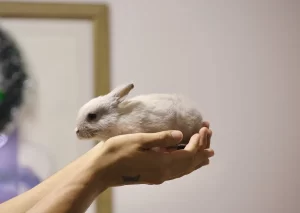Are you seeking comfort and support from a furry friend? Look no further than your beloved rabbit.
Discover how you can transform your cuddly companion into an emotional support animal (ESA).
In this article, we will guide you through the process of making your rabbit an ESA, from evaluating if a rabbit is the right fit for you to obtaining an emotional support animal letter.
Together, we’ll ensure your rabbit provides the emotional support you need.
In This Article
- 1 Key Takeaways
- 2 Understanding the Role of Emotional Support Animals (ESAs)
- 3 Evaluating if a Rabbit Is the Right Choice for You
- 4 Researching and Finding a Qualified Mental Health Professional (QMHP
- 5 Obtaining an Emotional Support Animal Letter
- 6 Training and Socializing Your Rabbit
- 7 Creating a Comfortable Living Environment for Your Rabbit
- 8 Traveling With Your Emotional Support Rabbit
- 9 Maintaining the Health and Well-being of Your ESA Rabbit
- 10 Frequently Asked Questions
- 10.1 Can Any Type of Rabbit Be an Emotional Support Animal?
- 10.2 How Do I Find a Mental Health Professional Who Can Provide an Emotional Support Animal Letter Specifically for Rabbits?
- 10.3 Are There Any Specific Training Techniques or Tips for Socializing a Rabbit as an Emotional Support Animal?
- 10.4 What Are Some Important Factors to Consider When Creating a Comfortable Living Environment for a Rabbit as an Emotional Support Animal?
- 10.5 Are There Any Specific Guidelines or Regulations for Traveling With an Emotional Support Rabbit, Such as on Airplanes or in Hotels?
- 11 Conclusion
Key Takeaways
- Emotional Support Animals (ESAs) provide comfort and support to individuals with mental health issues or disabilities.
- Rabbits can be a suitable choice for an ESA due to their ability to provide companionship and emotional support.
- When choosing a rabbit as an ESA, consider their space and time requirements, as well as their specific dietary needs and need for daily interaction and mental stimulation.
- To make your rabbit an ESA, obtain an emotional support animal letter from a Qualified Mental Health Professional (QMHP) who specializes in the specific area of assistance needed.
Understanding the Role of Emotional Support Animals (ESAs)
You need to understand the role of emotional support animals (ESAs) in order to fully comprehend their benefits. ESAs play a crucial role in providing emotional support and comfort to individuals who may be struggling with mental health issues or disabilities. These animals aren’t just pets, but rather they’re prescribed by mental health professionals as part of a treatment plan.
Understanding the legal requirements surrounding ESAs is essential. For instance, in order for an animal to be considered an ESA, the individual must have a qualifying mental or emotional disability, and they must obtain a letter from a licensed mental health professional.
Evaluating if a Rabbit Is the Right Choice for You
Consider both the pros and cons of owning a rabbit before making a decision. Evaluating the suitability of rabbit ownership for emotional support requires careful consideration. Here are some key points to help you make an informed decision:
- Rabbits can provide companionship and emotional support, offering comfort during difficult times.
- They’re relatively low maintenance compared to other pets, requiring less space and time commitment.
- Rabbits can be easily litter trained, making them suitable for indoor living.
However, they’ve specific dietary needs and require a balanced diet of hay, fresh vegetables, and limited pellets. Rabbits are social animals and need daily interaction and mental stimulation to thrive.
Before deciding on a rabbit as an emotional support animal, ensure you can meet their needs and provide a loving and nurturing environment. Reach out to professionals or rabbit owners for guidance and advice to make the best decision for both you and the rabbit.
Researching and Finding a Qualified Mental Health Professional (QMHP
When researching and finding a qualified mental health professional (QMHP), it’s important to thoroughly evaluate their credentials and experience, but also to trust your instincts and feel comfortable with the person you choose.
Finding the right QMHP is crucial in obtaining the support you need for your mental health journey. Look for professionals who specialize in the specific area you require assistance with, whether it’s anxiety, depression, or trauma.
Additionally, consider seeking recommendations from trusted sources such as friends, family, or other healthcare professionals.
A QMHP should be able to provide you with an emotional support animal letter if it’s deemed beneficial to your mental well-being.
Obtaining an Emotional Support Animal Letter
To obtain an emotional support animal letter, you can reach out to a licensed mental health professional or a therapist who specializes in providing this type of documentation. They’ll assess your need for an emotional support animal and determine if it’s appropriate for your situation.
Here are some key benefits of obtaining documentation for an emotional support animal:
- Improved mental well-being: Emotional support animals can provide comfort and companionship, reducing feelings of loneliness and anxiety.
- Increased social interaction: Having an emotional support animal can help facilitate social connections and improve social skills.
- Reduced stress and depression: Spending time with an emotional support animal has been shown to lower stress levels and alleviate symptoms of depression.
- Enhanced sense of purpose and responsibility: Caring for an emotional support animal can provide a sense of purpose and help establish a routine.
- Support during difficult times: Emotional support animals can offer unconditional love and support during challenging situations.
Training and Socializing Your Rabbit
You can train and socialize your rabbit by using positive reinforcement and providing plenty of opportunities for interaction with other animals. Training techniques such as clicker training and target training can be effective in teaching your rabbit commands and tricks. By using rewards like treats and praise, you can reinforce positive behaviors and create a bond of trust with your furry friend.
Additionally, bonding exercises are important for socializing your rabbit. You can introduce your rabbit to other animals in a controlled environment, allowing them to interact and become comfortable with each other. This can help reduce any fear or aggression your rabbit may have towards other animals.
Creating a Comfortable Living Environment for Your Rabbit
Although it may seem challenging, providing a comfortable living environment for your rabbit is crucial to ensure their overall well-being and happiness. As you strive to create a rabbit-friendly environment in your home, consider the following:
- Bunny proofing your home: Take measures to remove any potential hazards such as loose wires or toxic plants that could harm your rabbit.
- Provide ample space: Rabbits require enough space to hop, stretch, and explore. Consider providing them with a spacious enclosure or a designated area where they can freely roam.
- Offer hiding spots: Rabbits are naturally prey animals and feel more secure when they’ve hiding spots to retreat to. Provide them with cozy tunnels or boxes.
- Ensure proper bedding: Choose a suitable bedding material that’s comfortable and safe for your rabbit’s sensitive feet, such as hay or paper-based bedding.
- Enrichment activities: Engage your rabbit’s mind and body by providing toys, tunnels, and chewable items to keep them entertained and prevent boredom.
By implementing these tips, you can create a safe and stimulating environment that promotes your rabbit’s well-being and happiness.
Traveling With Your Emotional Support Rabbit
If you plan on traveling with your emotional support rabbit, it’s important to research and understand the specific guidelines and requirements set by airlines and transportation agencies. Airline regulations for traveling with emotional support animals can vary, so it’s crucial to be well-informed before your journey. Here are some traveling tips and airline regulations to keep in mind:
| Traveling Tips | Airline Regulations |
| 1. Ensure your rabbit is comfortable and secure during the journey. | 1. Contact the airline in advance to inform them about your emotional support rabbit. |
| 2. Bring necessary documentation, including a letter from a licensed mental health professional. | 2. Check the airline’s specific requirements for carrier size and type. |
| 3. Pack essential supplies, such as food, water, and bedding. | 3. Be aware of any additional fees or restrictions imposed by the airline. |
| 4. Research pet-friendly accommodations at your destination. | 4. Follow all security and safety protocols at the airport. |
Maintaining the Health and Well-being of Your ESA Rabbit
To maintain the health and well-being of your ESA rabbit, ensure you provide proper nutrition and regular veterinary care. Your rabbit’s happiness depends on your commitment to their care. Here are some key points to consider:
- Balanced Diet: Provide a diet rich in hay, fresh vegetables, and pellets to meet your rabbit’s dietary needs.
- Hydration: Ensure your rabbit has access to fresh water at all times to stay properly hydrated.
- Exercise: Allow your rabbit to hop and explore in a safe and spacious area to promote physical and mental stimulation.
- Grooming: Regularly brush your rabbit’s fur to prevent matting and check for any signs of illness or discomfort.
- Regular Veterinary Check-ups: Schedule routine check-ups with a rabbit-savvy veterinarian to monitor your pet’s health and address any concerns promptly.
Frequently Asked Questions
Can Any Type of Rabbit Be an Emotional Support Animal?
Any type of rabbit can be an emotional support animal as long as they have the right temperament and can provide comfort. To prepare your rabbit, focus on socialization, training, and creating a nurturing environment.
How Do I Find a Mental Health Professional Who Can Provide an Emotional Support Animal Letter Specifically for Rabbits?
To find a mental health professional for a rabbit’s emotional support animal letter, it’s important to connect with a qualified expert. They will assess the rabbit’s temperament and provide the necessary documentation.
Are There Any Specific Training Techniques or Tips for Socializing a Rabbit as an Emotional Support Animal?
To socialize your rabbit as an emotional support animal, try positive reinforcement training techniques like clicker training and offering treats. Gradually introduce your rabbit to new environments, people, and animals to help them feel more comfortable and confident.
What Are Some Important Factors to Consider When Creating a Comfortable Living Environment for a Rabbit as an Emotional Support Animal?
When creating a rabbit friendly home, it’s important to consider their comfort. Provide a cozy living space with plenty of hiding spots and toys. Bonding with your rabbit through gentle handling and regular playtime will also strengthen your emotional support relationship.
Are There Any Specific Guidelines or Regulations for Traveling With an Emotional Support Rabbit, Such as on Airplanes or in Hotels?
When traveling with your emotional support rabbit, it’s important to be aware of specific guidelines and regulations. These may vary depending on the mode of transportation and public spaces such as hotels or airplanes.
Conclusion
Congratulations on taking the steps to make your rabbit an emotional support animal! Just like a rabbit hops into our lives, they can also hop into our hearts and provide comfort and companionship.
Remember, finding a qualified mental health professional, obtaining an emotional support animal letter, and training your rabbit are all essential in ensuring their well-being and your emotional support.
With dedication and love, your rabbit can become the sweetest allegory of emotional support that you could have ever imagined.





